By Susie Coston, National Shelter Director
The end of spring has found us all aflutter at the New York Shelter, where we’ve welcomed more than 70 new feathered friends.
Reba and Willie
These two geese came to us from a private property in the Rochester area, where they were shut inside a small pen in a barn. In January, the property owner had obtained them from the local dog warden, who had found the geese as strays. What could have been a respite turned briefly into a nightmare for the pair: the woman is a suspected hoarder who has been reported to her local SPCA in the past. A friend of hers found out about Reba and Willie and called us, anxious to remove them from their miserable living situation. Fortunately, we were able to negotiate the release of the pair. At our shelter, they will have plenty of space to wander, graze, and swim, like all geese deserve to do.
Ace and Ventura
Around the same time, we learned of another goose in need. Ace had been living on a property in western New York for 15 to 20 years. He had once been a member of a flock, but all of his friends had been killed by predators. The property owner’s daughter and her aunt feared Ace would be next, so the aunt reached out to us. We gladly offered Ace a safe home at our shelter.
Geese are sensitive animals who form deep bonds with their mates and friends. Having witnessed the deaths of his companions, this poor guy was so distressed that he became neurotic and pulled out all his chest feathers. The feathers are now starting to grow back, but Ace is still frightened and has a great deal of emotional healing ahead of him. Finding him a friend to help him feel safe again has been a priority, but all of our residents are clearly paired up and bonded with other geese.
As luck would have it, however, we just welcomed another old goose to the shelter. Ventura had been living at the Humane Society of Greater Rochester’s Lollypop Farm since her caregiver passed away seven years ago. Though other geese also lived at the shelter, none would have anything to do with Ventura. Knowing how important companionship is for geese, Lollypop staff began seeking a new home where this lonely goose might be able to make friends. We offered to take her in, hoping that she and Ace could give each other the camaraderie that both needed so much. We introduced them, and they were soon smitten with each other.
Cricket
Cricket came to us through the intervention of Farm Sanctuary member Jillian Booth. While at a farmer’s market, Jillian came across a vendor selling chicks. One chick was having trouble walking due to deformed legs, a condition not unusual for these delicate young animals. While still in their eggs, commercially raised chicks are typically kept in incubators instead of in the care of their mothers. Any slight malfunction or error in the incubation process, or often congenital conditions, can cause deformities.
When Jillian inquired about the struggling chick, she was told that the baby was a “dud.” The vendor acknowledged that the chick would die and professed not to care. This indifference to, and even expectation of, the death of weak or special-needs animals can be found across the spectrum of animal agriculture, from large industrial facilities to seemingly homey small operations like this farmer’s market booth.
Jillian, however, would not accept the death of this little chicken whose life had just begun. She expressed her concern and, since the chick would not have sold, the vendor simply gave the baby to her. Jillian then got in touch with Farm Sanctuary, and we welcomed Cricket to the shelter, where we are now working on correcting Cricket’s leg problems.
Like most babies, chicks need companionship and become upset when they’re left alone. Because Cricket has no mother or siblings here, caregiver Abbie Rogers has been taking this youngster home with her at night and spending time with Cricket out in her garden, where the chick is now learning to walk and explore on slowly improving legs.
Bronwyn
Bronwyn was found running loose on the streets of Brooklyn. A “broiler” type chicken, the young “peep” had likely escaped from one of the area live markets, storefront slaughterhouses where animals are killed and sold onsite. Bronwyn was caught by a teenager, and a family friend kept the peep at her apartment awaiting avian influenza test results before transport to sanctuary.
Bronwyn arrived unable to stand due to septic joints. Since broiler chickens, who grow so quickly, can have trouble recovering from leg problems, we knew we needed to act fast. We started Bronwyn on antibiotics and pain medication and began using a sling to keep this youngster from spending too much time on the ground. To our relief, Bronwyn did recover and is doing much better now, running around with a pure zest for life.
Baby Turkeys
Over the years, many a group of baby turkeys has been left on our doorstep, saved from the factory farming industry by some anonymous rescuer. It happened again this spring, and when our live-in caregivers saw a light come on at our Rescue Barn, they discovered a box of eleven baby turkeys there.
Like the others we’ve welcomed, these babies had suffered de-beaking, an industry procedure in which the sensitive upper beak tip is amputated in order to curb fighting among stressed birds in overcrowded industrial facilities. Also like others rescued from the often filthy conditions of turkey factories, these three- to six-week-old newcomers were dirty, and some were sneezing. Already, however, they are feeling better — and ready to overrun the shelter!
Transport Accident Survivors
Our biggest wave of newcomers this season consisted of 60 chickens rescued by New York City Animal Care and Control (AC&C). Fifty-nine of these birds, colored “broiler” chickens likely raised at a farm in Pennsylvania or upstate New York, were headed to a city live market when the crates in which they were packed fell off the back of a transport truck. Such accidents are common since farm animals are transported with less care than is typically afforded to boxes of cereal. Last year, we rescued 87 chickens from a similar incident. Just as we arrived at the AC&C facility to pick up these accident survivors, someone dropped off a male industrial broiler chicken who likely escaped from a city live market.
Busy Days
With all these arrivals, our staff has been working hard to treat and rehabilitate newcomers while also continuing to provide individualized care to our incumbent residents and keep all shelter operations running smoothly. The work of rescue and sheltering is unpredictable, characterized by sudden, unexpected surges of activity. It demands a great deal from our staff, but no matter what, they rise to the challenge.
To complicate matters this spring, all the incoming birds who had not been tested for avian influenza (AI) prior to arrival had to be kept under strict quarantine. As we’ve reported, an epidemic of high-pathogenic avian influenza has swept through portions of the western and midwestern U.S. in recent months. Though no outbreaks have yet occurred in the eastern U.S., we’re taking every precaution to keep the birds here safe from this devastating disease. That means comprehensive isolation of untested new birds, with staff donning special iso gear and using foot baths whenever passing between these populations and the rest of the shelter. Though they make providing care more arduous, these measures are worth it to guard the safety of our residents. Thankfully, the majority of incoming individuals and groups have now tested negative for AI. We are still awaiting results from the group of 60 from New York City.
The transport accident that brought us those 60 chickens occurred on the Thursday before Memorial Day, and we spent the holiday weekend checking each chicken from head to toe; administering antibiotics and pain medications; cleaning, debriding, treating, and wrapping wounds; and stabilizing fractures. Some birds required trips to Cornell University Hospital for Animals, including three who received surgery: Rosalie Lightening, who needed her fractured femur repaired, and Memphis Belle and Sassy McCoy, who each had a wing so badly damaged it had to be amputated. All three surgery patients are recovering nicely in our Melrose Small Animal Hospital and quickly warming up to their human caregivers. Several other chickens have smashed and broken toes, some of which may need to be amputated as well. For flock members with wounds, fractures, and other ailments, daily checks and treatments are ongoing.
Despite their injuries and the fear that lingers from their harsh early lives, these chickens are beginning to settle in. They are happy birds and take such comfort in each other’s companionship. After so much stress and uncertainty, they are finally safe to enjoy friendship, rest, and the outdoors — probably for the very first time in their lives. In place of the slaughter that awaited them, they are now on the cusp of a spectacular summer.
Common Plight
Most of the birds we rescued this spring faced misery and the threat of death. Whether these hardships beset them at a private residence, at a farmer’s market, on a factory farm, or during transport, these birds were imperiled by a pervasive view of farm animals as objects for use rather than individuals worthy of protection.
The prevalence of this misconception is a necessary condition for the existence of the animal-agriculture industry. As the diverse backgrounds of our rescued animals illustrate, however, the consequences of this attitude play out not only in the crowded production facility or on the slaughterhouse kill floor but also throughout our society — downtown, down the street, next door. As long as animals are exploited for the food we eat, the suffering they endure will always hit close to home .

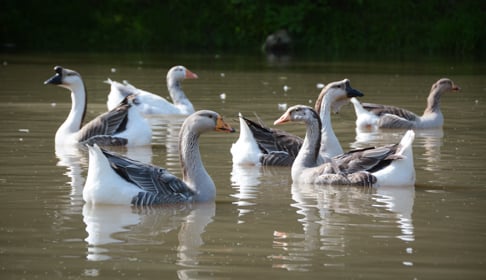
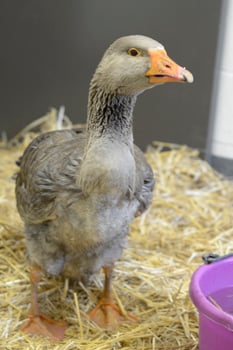
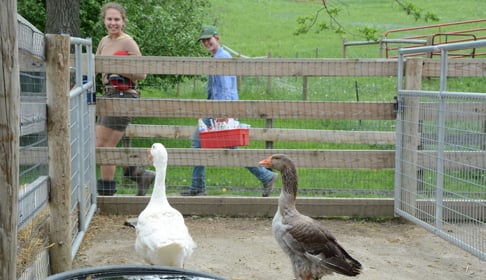
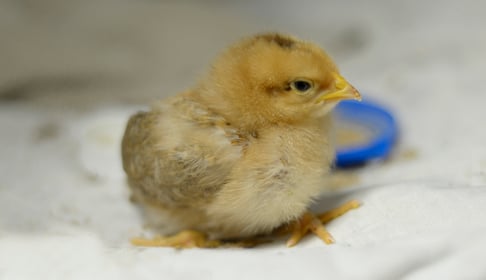
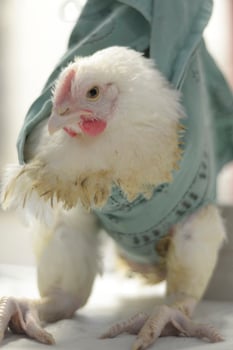
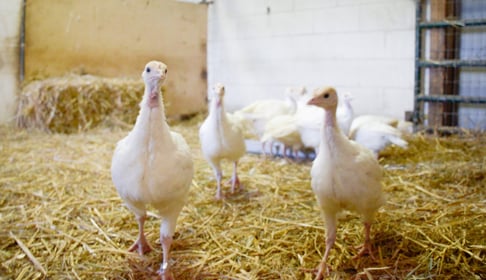
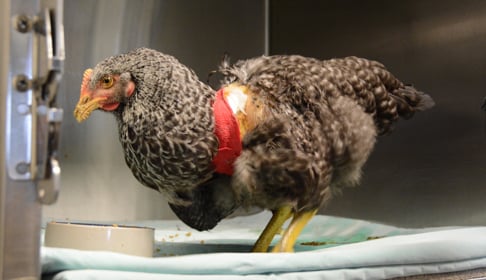
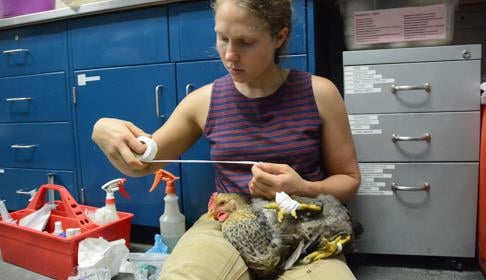
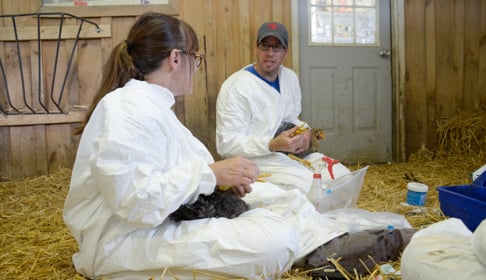
THANK YOU…THANK YOU…THANK YOU!!
You are all amazing and I personally can’t thank you enough for saving all the animals that you do. Farm Sanctuary is one of the main reason I became vegan years ago!!
I wish you all the best and keep up this extremely important work – you make the world a better place!!
thank you for sharing what has been going on at the new york sanctuary.
i am coming for a visit in sept. and hope i get to meet susie coston. if anyone can get through her two pages in the “living the farm sanctuary life” book, without crying… i just don’t know.
also it is soo true what you stated that the attitudes have to change even right next door to us ., down the street and in our society. i am trying.
What an amazing job you are doing…..thank you so much.
What a beautiful story. As an animal lover it is always heartwarming for me to see any situation where animals are rescued from a bad environment. So happy for the birds! This is why I am a vegetarian because I can’t stand to see cruelty done on ANY of God’s creatures!! Keep up the great work farm sanctuary!!
Thank you for all that you do. I don’t have a lot of money, wish that
I did, but I would like to help in anyway that I can.
A wonderful accomplishment by wonderful people. A gift is on the way.
I adore you guys! I wish there were sanctuaries in every city and town in the world. People need to SEE these animals happy in sanctuary. Maybe then they’d SEE that they are every bit of individuals as we are. And they need and deserve our love and protection. Ignorance is a difficult thing to overcome but when the ignorant insist upon abusing the innocent, it just has to be done. We can’t allow people to abuse these sweet innocent animals.
My house hen, Melody, is as sweet and affectionate as any dog. She’s trusting and loving and she even gets jealous when I love on the bunnies in the house. 🙂 I once met a goose that had landed in a California vineyard and stayed at the pond there. She actually helped give the wine tour! Of course I didn’t hear a word the human tour guide said, I was all about the goose. SO sweet! And oh so helpful. Animals only want to please us. They get so much joy in being truly seen by us and just hanging out with us. I adore them.
If you guys want to open another sanctuary here in Oregon I’ll run it for you. No charge. Just get me some help to do all the farm tasks because I’m just one little old lady. 😀 😀 I’m sure there are others out there that would be willing to work for free. Or actually not free. The clucks and whiffles and moos and whinnies, etc are more than enough “payment”. 😀 I’ll take THAT currency any day!
I AM SICKENED AT THE ATROCITIES THAT ARE DONE TO ANIMALS IN THE SLAUGHTER HOUSES AND HOW INHUMANLY THEY ARE RAISED. I DO NOT EAT MEAT FOR THAT REASON, WHEN I SEE A HERD OF BEEF CATTLE GRAZING I FEEL BAD BECAUSE I KNOW THEY WILL BE GOING TO THE SLAUGHTERHOUSE. THANK YOU FOR ALL YOU DO FOR THESE ANIMALS SO THEY GET A CHANCE AT A GOOD LIFE. I GIVE AS MUCH AS I CAN TO HELP IN YOUR CAUSE.
You folks are so amazing! God bless you for all you do for the animals.
after the sadness of this week, it is wonderful to read about what you all are doing to make this world a better place. it makes things a little less tragic knowing that there are good people like you out there. Just know you are really appreciated for all the hard work – keep it up.
Your stories and videos never fail to move me and bring tears, both happy and sad. Thank you for all you do and for sharing the stories of these beautiful birds.
i commend you for all you do for animals !!!
so sad that we can’t help them all !!!
Great post. I am going through some of these issues as well..
thank you for all you do!….smile
thank!!!
I have been a monthly donor to the Farm Sanctuary for the past 5 years–the above pictures and video are the reason why–thank you for all you do–you are the best advocate farm animals could have.
These animals would have had such a slim chance, if any chance at all.
Personal thank you so Susie Coston and Abbie Rogers for helping Cricket!
XXXXXXXXXXX
I have been a monthly donor to Farm Sanctuary for quite awhile and will continue to do so. You do incredible work with these precious animals. Thank you so much for saving them and helping them live wonderful lives. Please don’t ever stop fighting factory farming. You are awesome!!!